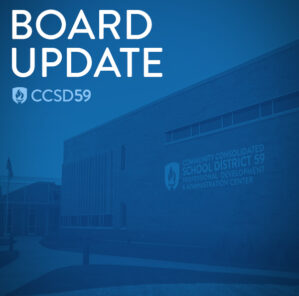Student Data Privacy
Student Data Privacy
As CCSD59 strives to maintain the privacy of student data, we are dedicated to making our work and diligence in that effort transparent. The information below is listed in compliance with the Student Online Personal Protection Act (SOPPA), effective July 1, 2021.
What is SOPPA?
What happens to the student data that we send to a third party vendor? Information that includes names, birthdates, etc. may be provided by CCSD59 to a third party, including IXL, iReady, etc.
What protections do those companies have in place to make sure that our student data is not sold or freely given to others? This is exactly what SOPPA looks to address.
As part of SOPPA, these companies must enter into Data Privacy Agreements (DPA) with each district they work with, and these agreements outline what data is stored, how it is protected, what the company can and cannot do with that data, and what they will do in the event of a data breach.
a
What are Data Privacy Agreements (DPA)?
CCSD59 leverages the Student Data Privacy Consortium (SDPC), which is a unique collective of schools, districts, regional, territories and state agencies, policy makers, trade organizations, and marketplace providers addressing real-world, adaptable, and implementable solutions to growing data privacy concerns. If you would like to read more about the SDPC, click here.
Through the SDPC we enter into contracts with third party vendors who handle our student’s data. You can view the DPAs that CCSD59 currently holds below.
a
Important Data Privacy Laws
Student Online Personal Protection Act (SOPPA): Guarantees that student data is protected when collected by educational technology companies, and that data is used for beneficial purposes only.
Children’s Online Privacy Protection Act (COPPA): Restricts the collection of personal information from children under 13 by companies operating websites, games, mobile applications, and digital services that are directed to children or that collect personal information from individuals known to be children.
Children’s Internet Protection Act (CIPA): Imposes certain requirements on schools that utilize the federal E-Rate program to receive discounts for internet access and other technology services, or that receive federal grants for other technology expenses.
Family Educational Rights and Privacy Act (FERPA): Governs information in a student’s education record, restricting access and use of student information.
a
INformational resources
- Student Data Privacy Laws (Legislation Brief)
- Student Online Personal Protection Act – SOPPA (Legislative Brief)
- Data Breach Notification
As CCSD59 strives to maintain the privacy of student data, we are dedicated to making our work and diligence in that effort transparent. The information below is listed in compliance with the Student Online Personal Protection Act (SOPPA), effective July 1, 2021.
What is SOPPA?
What happens to the student data that we send to a third party vendor? Information that includes names, birthdates, etc. may be provided by CCSD59 to a third party, including IXL, iReady, etc.
What protections do those companies have in place to make sure that our student data is not sold or freely given to others? This is exactly what SOPPA looks to address.
As part of SOPPA, these companies must enter into Data Privacy Agreements (DPA) with each district they work with, and these agreements outline what data is stored, how it is protected, what the company can and cannot do with that data, and what they will do in the event of a data breach.
a
What are Data Privacy Agreements (DPA)?
CCSD59 leverages the Student Data Privacy Consortium (SDPC), which is a unique collective of schools, districts, regional, territories and state agencies, policy makers, trade organizations, and marketplace providers addressing real-world, adaptable, and implementable solutions to growing data privacy concerns. If you would like to read more about the SDPC, click here.
Through the SDPC we enter into contracts with third party vendors who handle our student’s data. You can view the DPAs that CCSD59 currently holds below.
a
Important Data Privacy Laws
Student Online Personal Protection Act (SOPPA): Guarantees that student data is protected when collected by educational technology companies, and that data is used for beneficial purposes only.
Children’s Online Privacy Protection Act (COPPA): Restricts the collection of personal information from children under 13 by companies operating websites, games, mobile applications, and digital services that are directed to children or that collect personal information from individuals known to be children.
Children’s Internet Protection Act (CIPA): Imposes certain requirements on schools that utilize the federal E-Rate program to receive discounts for internet access and other technology services, or that receive federal grants for other technology expenses.
Family Educational Rights and Privacy Act (FERPA): Governs information in a student’s education record, restricting access and use of student information.
a
INformational resources
- Student Data Privacy Laws (Legislation Brief)
- Student Online Personal Protection Act – SOPPA (Legislative Brief)
- Data Breach Notification



